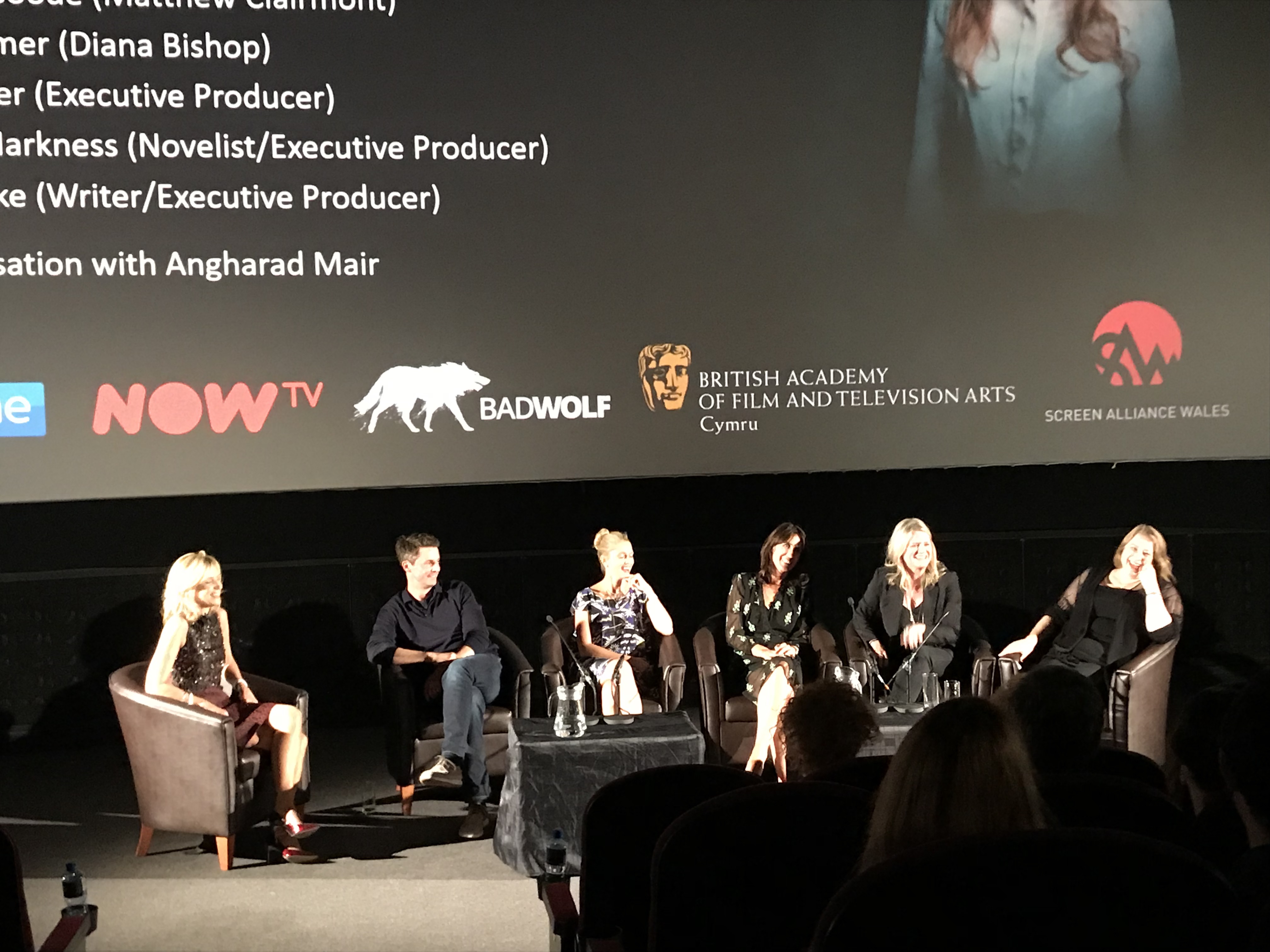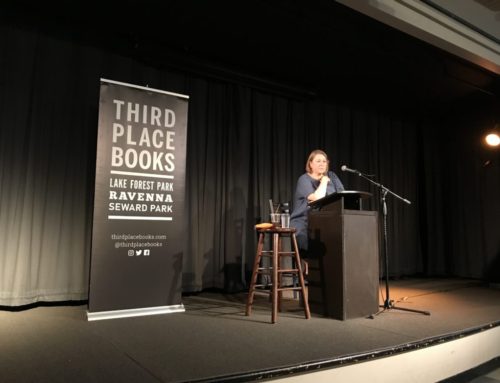Happy #Witchmas everyone!
We’re thrilled to bring you an abridged version of the Q&A with the brilliant panel of executive producers, Jane Tranter, Kate Brooke, and Deborah Harkness, with Teresa Palmer and Matthew Goode, at the Cardiff premiere of A Discovery Of Witches. The panel was moderated by Welsh television presenter Angharad Mair.
Angharad: Well, it’s my great honor tonight to be sharing the Q&A with some incredibly talented people. So, please will you welcome, onto the stage here, Deborah Harkness, the author of the All Souls Trilogy, Jane Tranter, Kate Brooke, the stars of the incredible series with us tonight. So, please, welcome as well, Matthew Goode and Teresa Palmer.
Angharad: Thank you, all of you. Deborah, I will start with you because if you’re a professor of history at the University of Southern California. And, this was your first work of fiction. This was your first novel. It became a huge success, an international bestseller. What do you think it was about this book that made it into such a great success? Did you know at the time that what you were writing was going to be so popular?
Deborah: No. There’s no way that I ever dreamed it would be so popular. I think I thought that maybe my mom and a few of her friends might read it. So, when other people read it as well, it was a wonderful surprise and a delight and an unexpected one. I think what really makes the story stand out for people is the characters, these wonderfully rich characters that you saw brought to life so brilliantly off of the show. There’s really a character that everyone loves and everyone loves to hate. They wanna know more about them, to spend more time with them. They just kind of keep coming back for more. So, the show is really filling what’s become really a keen appetite out there in the public for more information about Diana and Matthew and their friends and their adventures.
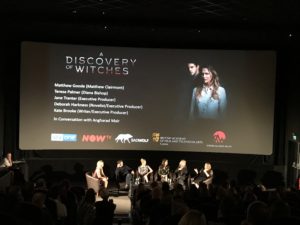 Angharad: I read a great quote from Glamour magazine that said that they’ve fallen head over stilettos for the book.
Angharad: I read a great quote from Glamour magazine that said that they’ve fallen head over stilettos for the book.
Deborah: It did. It was not a bad moment for a middle-age college professor for sure. That people fall head over stilettos for something you’ve written in your pajamas.
Angharad: Jane, where does the idea come from? About the book that should be made into this incredible experience?
Jane: I always say that the things that really attracted me to Deb’s novels are two things. Well actually, three things. One is, it’s just a bollocking good read. The second is that it something very rare in television which is a love story. And it’s a love story without, in season one, at least, a bonnet or a bow or crinoline in place. Normally in television, when you want something as romantic as A Discovery of Witches is you have to go to 19th century literature. And that really spoke to me. That actually, you could tell stories that are in a contemporary setting. And I think the third thing is, I really felt, with the trilogy novels, that what Deb has done, is that she had written a love letter to humanity, or a love letter to the world. That it was about, which is something very important to me, so it was kind of personal as well as professional, about acceptance of the neurologically diverse. Of the different, of the other, whatever your brain is like, whatever gender you are, whatever sexuality you are, there is space in the room for everyone. And that theme. That is such an important one for our times. Deb presents as a Trojan horse. She doesn’t hit a reader, and never hits an audience over the head with it. But it’s there in every pore and every fiber of what Deb writes. And I hope it’s there in every kind of minute of reel of film that we did.
Angharad: It has been called a sophisticated fairytale for grown-ups. Normally, in fairytales, there is a moral to the story. So is that the moral of this story?
Deborah: Yeah, I think the moral of the story is that empathy is the greatest superpower. And that being different can save the world. And that those differences are things we should treasure.
Angharad: Kate, how did you then come into writing? How difficult is to take a big book, because it’s a big book. So how did you turn a big book into something that the screen can play.
Kate: Well firstly, I came into it because Jane offered it to me. And I said, I’m not really a fantasy person. You know, I’m not quite sure what this is. And I read them, and I just thought, they defy normal. They are not … Although they do have brilliantly unusual mythology. In the book, Deb takes the story from Diana’s perspective, and from Matthew’s perspective. And we made the decision quite early on that we wanted to go into the other characters worlds as well.
Matthew: Well the first hundred pages also, Diana gets to the Bodleian Library, which is fascinating as a read in general, but I think if you put that, say, 90 minutes being in the Bodleian on TV, it won’t work.
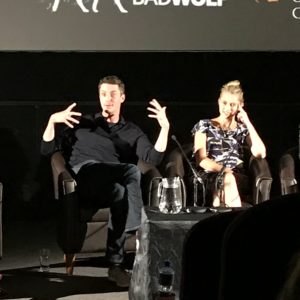 Matthew: [On the TV adaptation] it’s the Bodleian Library recreated by James North. Thank God he live in Wales, otherwise he’d be working on Fantastic Beasts.
Matthew: [On the TV adaptation] it’s the Bodleian Library recreated by James North. Thank God he live in Wales, otherwise he’d be working on Fantastic Beasts.
Jane: It looks so real. I mean, for anybody who knows the Bodleian, it looks as if it’s all been shot there.
Angharad: Was this a collaboration? Did you work together, is there some tension when you’re actually writing a screenplay?
Deborah: There’s always tension. Creativity is, in its essence, there has to be some tension. You know, so I think that what happens is, you get clearer after those moments of tension, and then what you do is so sharp. I think it’s one of the best adaptations of a book I’ve ever seen because what Kate and her writers did was to really get the characters and the feeling. And that is the hardest thing to do.
Matthew: The fact that it looks so cinematic!
Jane: That really is a tribute to Juan Carlos Medina and to see some of that was brilliant. The best adaptations take the threads, follow there in a novel, or there in another’s mind. [inaudible] Because otherwise, it’s chapter by chapter, you are literally pulling out threads. I’m sure it must sometimes feel like you’re literally pulling out fibers of your body. But as long as you remain true to that thread, as you pull it out, you end up with an adaptation that, where it’s often hard to see where the author and screenwriter begin and end. It doesn’t always feel like that at the time, but that’s the finished result.
Angharad: Teresa, what was it like, when you got the call, asking if you wanted to play this part of the witch?
Teresa: It did feel otherworldly for me, pardon the pun. I fell in love with this book when I read it. I just fell in love with Diana’s vibrancy. She’s a complex character, such an incredibly strong woman, but she also has vulnerabilities and insecurities, and all the things that make humans so beautiful and interesting. And then of course, she’s the most powerful witch in the world, so there’s so much there. So I just wanted to live and breathe this character and go on this journey with her. I sat down with Jane and she gave me this beautiful ten-minute talk about who Diana is, and what this is gonna look like, and what it means to bring my family to Wales. Big commitment for me, and three children. And then I met this guy and straight of the bat, we were goofing around, and having fun. The chemistry was just there.
Angharad: Is that important, for all actors, that the chemistry is there in order for you to replicate it on screen?
Teresa: Yes.
Matthew: We did have a chemistry read in LA.
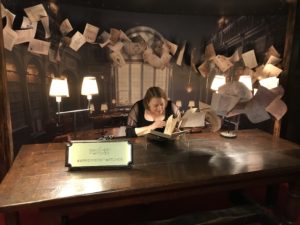 Teresa: I mean, I have three kids, just like connecting over that. Super tired parents, crazy children. It was great, and it was just there, and we played around with the characters, and we found it in the room.
Teresa: I mean, I have three kids, just like connecting over that. Super tired parents, crazy children. It was great, and it was just there, and we played around with the characters, and we found it in the room.
Angharad: And it’s the same for you, about the call asking you to play a vampire. Although if you read the book, it does say that this particular vampire is incredibly good looking.
Matthew: I know, that’s why I didn’t think I was gonna get the job. No, because I never met Jane. She sort of made the decision, it wasn’t my decision. She made the decision for me.
Jane: It’s interesting, because I think in a way, with Matthew to sign on, Deb sort of wrote a kind of quintessential British band, where lots and lots of things are kind of pushed down, and you have to work quite hard to get them out and he’s kind of brooding, a romantic, and secretive.
Matthew: He’s tragic.
Jane: And Matthew is like you see the tip of the iceberg, and everything else, he’s ancient.
Jane: And so, you have to build … It’s a phenomenal thing for an actor to do. Because you have to build [inaudible] on top of the biggest piece of backstory impossible to get your head around. How do you act that? And Matthew’s brilliant at all of it.
Angharad: What struck me as well, in watching the first two episodes. It’s obviously a love story, but it can stop as a thriller as well. For anybody who’s maybe thinking that this is about witches and daemons and vampires, it’s struck me more as a thriller. Something that was some kind of sci-fi.
Jane: I think that’s very important to me, to kind of make it feel visible. However, I [inaudible] love stories well, and it is a unique love story. But you need a tension and a muscularity. And it was all there in the book, because all those antagonists are there. We’ve got Knox. We kind of bought the fold.
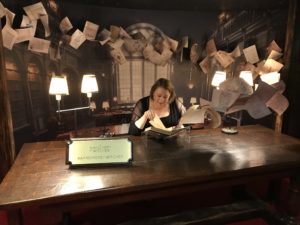 Angharad: The book that comes to life to the library. Is there such a book?
Angharad: The book that comes to life to the library. Is there such a book?
Deborah: Well, actually, 782 is a real manuscript and it’s really missing. So I can’t tell you what’s in it. But this is my best guess of what might be in.
Matthew: Probably just a lot of Kama sutra. [laughter]
Angharad: [To Teresa] What about the kind of research that you would perhaps do?
Teresa: It was a fairly new set of skills I had to learn. I’m not a rower. I am now. I had a great teacher, actually. He thought it was hilarious to get me to stand up and try and tip me out, so he’d have me take the oars off the water so it would stop tipping. Until I really freaked out and cried. He put it back down again. But he wanted me to feel the fear of all the water, so that I had that experience, and I would be okay. And it was really interesting, because you get really in your head. And as soon as you liberate yourself from overthinking the strokes and you know you’re raw, it comes in this beautiful rhythm. It’s quite meditative, I found. And we got to learn to horse ride, I went with Deb, she actually brought out some old manuscripts for me to handle at the University of Cardiff. And I had never seen old books so I was probably much too rough with them, I was like woo, this is exciting. But yeah, it was really interesting to wrap my head around all that sort of stuff.
Jane: We were really, I mean all the heads of department were … But I think that one of the things that was important is that [the story] is set in the contemporary world. Because you have to do it with complete authenticity, because if you want an audience to believe that witches and vampires and daemons walk amongst us and that their story is going on amongst us. And I’m not for a minute saying it’s not that. But it might be a new idea to some of the audience. They’ve got to believe everything else. So they have to believe in Madison, in the Bodleian. Lives that all of our characters are living.
Jane: And I guess it sounds insane to think “Well, in that case we’ll do it when we’re in Cardiff, as oppose to going to all of those places.” We did some of them, and some of that stuff was in Oxford, Venice. We do go out of Wales, but I really like going into the studios. I think that the attention to text and performance, that not having thousands of location moves gives you. And also when you go on location, all of the attention is given to the location and you’re moving the actors around in that. As opposed to when you’re filming on a set. You’ve got over that in a building process, we’ve let that sit into existence and then you turn it over to the actors and the words. And I’ve got the camera on and I think, for me, it doesn’t every work for every genre or every piece, but I certainly think in this kind of genre, where it’s 90% real and 10% larger than life, they’re going to film in that studio environment, and really lifts it and allows that sort of intensity of performance that we see from every one of the actors on also.
Angharad: But above the facts, you would also be filming some of the scenes outside. As well as one particular scene that’s in Episode 2, where you’re actually hunting a deer.
Matthew: Yes. Running out from Scotland.
Angharad: That must have been quite a scene to shoot.
Matthew: It was. It was, I don’t actually run backwards, by the power of my eyes, especially because it seems so. It was great. I holiday there a lot. Actually, I was there a few times with my parents, I was a lot younger. I like being outdoors and it’s quite special, and also was working on I think a really important part of the story, is the relationship with Matthew, how … this is a hint, and so that was great. Although, at one point, it was a bit hairy, it was pretty windy out there.
Angharad: And the book is actually is written on the point of being, well found on [inaudible] So are there similarities. Have you written you in this book?
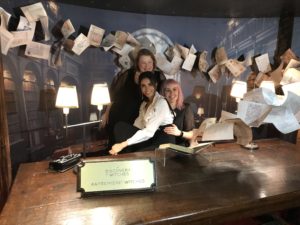 Deborah: Yes. I mean they’ve all got a bit of me in them. With Theresa’s character, obviously, we do the same thing, the historians. Matthew’s got my love of wine. Em has my love of cooking. Sarah has my blunt tongue. I could go down the whole row, every single one of them has some part of me in them.
Deborah: Yes. I mean they’ve all got a bit of me in them. With Theresa’s character, obviously, we do the same thing, the historians. Matthew’s got my love of wine. Em has my love of cooking. Sarah has my blunt tongue. I could go down the whole row, every single one of them has some part of me in them.
Angharad: What a wonderful way to create characters.
Tanya (Moodie): In preparing for what I read in the books, so drawn in, and enchanted, was also fascinated by the detailed descriptions of the characters, their backgrounds, their appearance what they wore, what they did, what they ate… and then interfacing with a lot of their fans, dedicated, passionate fandom all around the world. And so obviously they’ve lived with these characters for all of these years. The way Agatha was described in the book was very different to who I am as a actor. And going into it I have to say I’m grateful for that because I got a chance to be a part of it. I was wondering how did you decide to depart from the original fiction. Did you have any concerns or worries about it? Are you happy with it was wrote now because its got such positive feedback from the fandom?
Angharad: That’s a really good question because do you have to worry about the fans of the books?
Deborah: Well sure. Because they’ve been along on this ride for years and years and years at this point. You know at this point it’s funny, I will often describe hair color and clothing, or eye color, but otherwise, and people will latch on to those sort of things, but for me, honestly, when we were doing casting, and absolutely brilliant casting, director in Kate and James. And she had such an eye for people who just were that character. So I still remember you doing Agatha, “that’s Agatha” you know? And the only one we ever worried about was Marcus because he had this dark hair. And I said “don’t dye his hair.” He’s perfect the way he is and everyone will get over it.
Angharad: So we’ve all conquered the casting.
Jane: Yes. And I think this is often the case in casting, much like books, although I don’t think it’s that often the case where you have readers who are so passionate about the novels, who are so brilliantly, managed isn’t the right word actually, but are able to talk it, and kind of is able to take them on a journey and all sorts of things that sort of spin off on the trilogy and novels. But I do think that when you case, you have to cast the spirit of the character. Because if you’re just casting look-a-like, you will—and I believe this is the same of your casting, a factual drama based on real people. If you just cast look alike as opposed to going for the essence, then that’s all you tend to get. And then I think you’re having to push the actors into having provide performances where they’re restrained, as opposed to casting the spirit and then allowing the actor to find that new iteration of the character. It’s not that they’re a completely different character but it’s a completely different iteration of the character.
Angharad: That essence would have been important to you, I suppose?
Kate: Sort of from the books onto the screen. Absolutely, essential, yes. You look for voice. So for example, Alex Kingston, has the voice. You look for the voice of that character. It’s not just essence, its also funnily enough, it’s a voice that you hear. Which isn’t necessarily the dialogue from the book, but it’s a voice, or it’s a sense of humor. And you do also look for someone like Satu, the essence of the character, you build on it. What we’ve done on that character, we’ve given her abilities, not just made her an antagonist, we’ve actually given her a journey. But the essence of the character is still that from the book.
Angharad: For the readers who haven’t seen it yet, if you could sum it up, in what way does this show differ from all the other kind of vampire romance shows that are out there?
Jane: It goes back to the point of acceptance of “otherness.” That the whole point is that vampires and daemons aren’t as human propaganda. Folklore has said that they are, and that every film or book or television series that you’ve seen which is vampires and daemons lean into that piece of human propaganda. Which is common to place, because humans are very firm instinct with us is to be fearful of things that are not like ourselves. And a complete shuts all of that down. And you don’t see that in anything else in the show. And then she builds it up into microscopic detail about what it means to be a vampire, right down to what they like to wear, what they eat, how they mate, how they behave, and its building up the four species that are in our world.
Angharad: And Theresa, when we first see you, you don’t seem to be a witch as we would think of a witch.
Teresa: Yeah. Yeah, I love that. It’s a contemporary setting, we could be sitting in a room, there could be a vampire here or a witch or a daemon, and Diana in particular is very much denying her heritage. She doesn’t want to have anything to do with being a witch, her parents were killed, they were witches and they were killed. And ever since then, she has denied that side of herself, and it’s not until she stumbles across the Ashmole manuscript, and this guy enters her life, that she’s really forced to just lean into her authenticity and its beautiful because she shines when she’s in that place. And she completely blossoms and she goes on this incredible journey. I think there’s a really beautiful lesson in that too.
Audience question: I have 2 questions, as an artist, I love painting and drawing, I was thinking about wardrobe for Matthew and Theresa. Did they help you develop your character or support your character at all? And also, second question, for anybody there, in terms of color, for example Theresa, you use blues like aqua blues and Matthew you use dark blues, so if there is any meaning between those colors and also the colors that you use throughout the series and for the characters.
Teresa: I remember that blue coat that everyone has really fallen in love with. I believe we dyed it that color. It was originally gray. And we knew that in the beginning that we wanted Diana’s outfits to really make her eyes pop. But she is very structured, her outfits if very tailored and structured, jackets, and that also represents her life. Everything is about structure and she is in control of certain aspects of her life. And as the series goes on, the wardrobe tells the story of her kind of unraveling and her becoming a little bit freer and liberated from this pressure she’s been putting on herself to deny who she is. And you actually see as the character goes on she’s wearing looser t-shirts and everything is getting a little more relaxed.
Angharad: Did you have any input into that wardrobe?
Teresa: Yeah, I think we both did, didn’t we?
Matthew: Yeah, I liked it, actually.Because also he [Matthew]’s been hanging around for 1500 years. So I think he’s got quite a back catalog. And it also helps with blending in, sort of a camouflage, as well. So there was this palette, which was slightly darker at the beginning. And I’m pretty conservative, I’m pretty much costume designer nightmare like, “I’ve gotta put in some red”; “how about ‘no’.” [laughter]
Angharad: And having been around for 1500 years or so, do you age?
Matthew: Well, we’ll see by season 3. [laughter]
Audience question: I really enjoy the show as everyone else here I think. One particular question on location. Thank you for bringing this production to Wales. It seems I can see Wales playing Oxford, Wales playing Scottland.
Jane: Wales will definitely just play Wales. But we’re adopting a discovery, which also a trilogy, so Wales will take on the shape of the locations of that particular narrative that it takes to us, just as it does one of the other adaptations. But I am passionate that one day, we’ll have Wales being in a production.
Angharad: … Cardiff Bay, and, you know, it all helps with the economy, but it’s more than that, really. It is magic to think that we in Wales can look at something like this, which is so fantastic, and think, “That was made here.” It’s brilliant, so, thank you.
Jane: I should just say that … And it is really, really kind, and really generous that you say those things, but Wales is God’s own country, and we’re only good as the place will enable us to be. So, it’s our pleasure and it’s our gratitude, not the other way around.
Angharad: Can I ask of the cast, who are here in the front row to stand up so we can all cheer you. And thank you to my wonderful panel, so to Deb, to Jane, to Kate and Theresa and Matthew, thank you, you’ve been brilliant. Can’t wait for the series to start. September the 14th. So, it’s starting very soon, and I’m going to tell everybody about it, because it’s brilliant.
THE END

